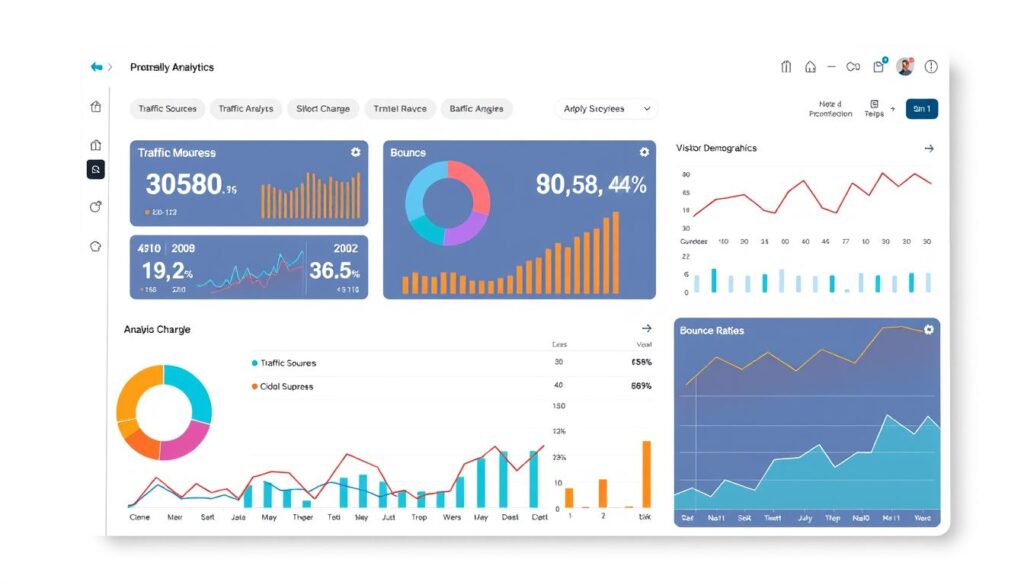Is your website lost in the vast digital ocean? Standing out online is harder than ever. Search engine optimization (SEO) is a powerful tool to help.
SEO boosts your website’s visibility and drives organic traffic. By mastering these techniques, you can climb search engine rankings. This increases your online exposure and attracts more customers.
Content marketing is key in SEO strategies. Creating valuable, relevant content aligns with search engine algorithms. This boosts your website’s visibility and engages your audience.
In this article, I’ll share essential SEO techniques. These will help you reach more people and climb search engine rankings. Let’s unlock your website’s potential!
Key Takeaways
- SEO is essential for improving website visibility and driving organic traffic
- High-quality content is prioritized by search engines and leads to increased user engagement
- Optimized website structure and navigation enhance user experience and search engine indexing
- Meta tags optimization can boost click-through rates and signal content relevancy
- High-quality backlinks from authoritative websites establish credibility with search engines
- Regular monitoring of SEO metrics is crucial for assessing strategy effectiveness
Understanding the Importance of SEO in Today's Digital Landscape
Search engine optimization is key in the digital world. I’ve seen how SEO can change a website’s performance and lead to success. Let’s look at why SEO is important and how it stacks up against paid ads.
What is SEO and Why It Matters
SEO helps a website show up better in search results. It’s vital because it brings in more visitors and builds trust. Websites on the first page get over 90% of all organic traffic.
The Impact of SEO on Website Success
Good SEO can really help a website succeed. Companies that focus on SEO see a 3 times better return on investment. SEO can also boost organic traffic by up to 1000% and increase conversions by 14.6%.
SEO vs. Paid Advertising: A Comparison
Paid ads give quick results, but SEO offers lasting gains. Organic search brings in twice as much revenue for B2B companies. SEO is also cheaper because it doesn’t need constant spending.
- SEO builds trust and credibility
- Organic search influences 25-50% of revenue for many organizations
- Local SEO attracts customers searching for businesses “near me”
In my experience, a solid SEO plan is crucial for website success today. It’s a smart investment that keeps driving organic traffic and boosting visibility for years.
Keyword Research: The Foundation of Effective SEO
I explore keyword research as the key to successful SEO. It’s about finding out what people search for related to your business. By knowing these keywords, you can make your content more relevant and increase your website’s visibility.
Tools like Google Keyword Planner, SEMrush, and Ahrefs help find valuable keywords. They show search volume, competition, and related terms. For example, keyword research reveals “small business SEO” gets 2,500 searches monthly. Meanwhile, “SEO tips for small businesses” gets 300.
Long-tail keywords, with three or more words, are often better. They have less competition and attract more focused users. For example, “best organic coffee beans for espresso” is more specific than “coffee beans,” drawing users ready to buy.
- Short-tail keywords: High search volume, competitive
- Long-tail keywords: Lower volume, targeted traffic
- Search intent categories: Informational, Navigational, Transactional, Commercial
Understanding search intent is key. It helps you guess what users are looking for and tailor your content. This way, you can rank higher in search results and attract more relevant visitors.
“74.6% of companies consider keyword research vital in their SEO strategies.”
After finding the right keywords, use them wisely in your content. Include them in titles, headings, meta descriptions, and body text. But always keep your content easy to read and user-friendly, not just stuffed with keywords.
On-Page SEO Optimization Techniques
On-page SEO is key to making your website more visible in search results. I’ll share some important techniques to help you optimize your web pages well.
Title Tags and Meta Descriptions
Creating catchy title tags and meta descriptions is crucial. They should include the right keywords and match your page’s content. A good title tag can boost your click-through rates from search results.
Header Tags and Content Structure
Header tags (H1, H2, H3) help organize your content. They make it easier for users and search engines to understand. It’s good to include your target keywords in these headers. This improves readability and boosts your SEO.
Internal Linking Strategies
Having a good internal linking strategy is important. It helps distribute link equity and makes your site easier to navigate. By linking related pages, you create a web of information for search engines. This also encourages visitors to explore more, which can increase engagement and lower bounce rates.
Remember, on-page SEO is an ongoing task. It requires constant tweaks and optimizations to stay competitive in search rankings. By focusing on these techniques, you’ll improve your site’s visibility and attract more customers.
For more detailed insights on on-page SEO, check out this comprehensive guide. It covers more optimization strategies.
Creating High-Quality, SEO-Friendly Content
Quality content is key to successful content marketing. It’s not just about keywords; it’s about making engaging, informative content. This content should connect with your audience, improving their experience and your SEO.
Let’s explore some key strategies:
- Create comprehensive, in-depth articles
- Use visual content to increase engagement
- Regularly update and refresh your content
- Address your audience’s needs and interests
Did you know long-form content (over 1,000 words) is great for SEO? It gives detailed answers to searches, helping your site rank better in Google. It’s not about writing novels, but about being thorough when needed.
“Content is king, but engagement is queen, and the lady rules the house!”
Adding multimedia elements can boost user engagement. Videos, infographics, and interactive content like quizzes keep visitors longer. In fact, 91% of businesses use video in their content marketing.
Creating top-notch, SEO-friendly content is a continuous effort. Stay current with your industry and SEO trends. Always focus on what your audience needs. This way, you’ll not only rank better but also gain a loyal readership that values your content.
For more on content marketing, check out this resource.
Technical SEO: Enhancing Your Website's Backend
Technical SEO is key to making your website more visible and better performing. I’ve seen that optimizing the backend can really boost your search rankings and how users experience your site.
Site Speed Optimization
Site speed is super important in technical SEO. A 32% increase in bounce rate happens if your site takes more than two seconds to load. To fix this, I use image compression, CSS and JavaScript minification, and browser caching. These steps can make your site much faster and keep visitors interested.
Mobile Responsiveness
Today, 55% of all website visits come from mobile devices. Google now favors mobile versions of sites for ranking. I make sure all websites work well on any device, giving users a smooth experience no matter their screen size.
SSL Certification and Security
SSL certification is crucial for keeping your site safe and trustworthy. Since 2014, Google has seen HTTPS as a ranking factor. Getting SSL is now a must for technical SEO. I always suggest using HTTPS to safeguard user data and boost your search rankings.
By concentrating on these technical SEO areas, you lay a strong base for your website’s success. A well-optimized site not only ranks higher but also offers a better user experience. This leads to more engagement and sales.
Off-Page SEO: Building Authority and Trust
Off-page SEO is key to making your website more visible and trustworthy. I’ve learned that over 50% of search rankings come from off-page factors. This means strategies outside your website can greatly improve your rankings.
Link building is a big part of off-page SEO. Getting backlinks from good sites shows your content is valuable. A strong backlink profile boosts your domain authority and search visibility. To get these links, create content that people want to share.

Social signals don’t directly affect rankings but are vital for authority. Being active on social media and sharing content increases visibility. This can lead to more backlinks. A strong social media presence boosts your brand’s credibility.
For local businesses, customer reviews are crucial. Good reviews, press mentions, and influencer partnerships build trust. I tell my clients to get positive reviews on Google and other platforms as part of their off-page SEO strategy.
Google wants to show authoritative and trustworthy results. By using these off-page SEO tactics, you’re not just boosting your rankings. You’re also showing your credibility to search engines and potential customers.
Boost Website's Visibility Through Local SEO Strategies
Local SEO is a game-changer for businesses targeting specific areas. I’ve seen firsthand how optimizing for local search can skyrocket a company’s online presence. Let’s dive into some powerful strategies that can help you dominate your local market.
Google My Business Optimization
Your Google My Business profile is your digital storefront. It’s crucial to keep this information up-to-date. Fill out every section, add photos, and encourage customer reviews. This simple step can dramatically improve your local search rankings.
Local Citations and Directory Listings
Consistency is key when it comes to local citations. Ensure your business name, address, and phone number (NAP) are identical across all online platforms. I recommend getting listed in popular directories like Yelp and TripAdvisor. This not only boosts your local SEO but also increases your chances of being found by potential customers.
Location-Specific Content Creation
Creating content that resonates with your local audience is a powerful way to improve your search visibility. I’ve found success in writing blog posts about local events, incorporating area-specific keywords, and even creating location-based landing pages. This approach helps search engines understand your relevance to local searches.
Remember, local SEO is an ongoing process. Regularly update your Google My Business
profile, monitor your citations, and create fresh, locally-focused content. By implementing these strategies, you’ll be well on your way to dominating your local search results and attracting more customers to your business.
“Local SEO isn’t just about rankings—it’s about connecting with your community and being there when they need you most.”
Leveraging Analytics for SEO Success
In the world of SEO, data is key. Website analytics tools give us deep insights into how users interact with our sites. Google Analytics and Google Search Console are must-haves for tracking our SEO journey.
Google Analytics gives us a lot of info on what happens after visitors arrive. First, create an account, add your site, and put the tracking code on your website. Next, set up goals to track key events. This lets us see:
- Organic traffic trends
- Top-performing pages
- User engagement metrics
- Conversion rates

Google Search Console adds to Analytics by showing us data before visitors click. It helps us see site search traffic, fix problems, and improve our search visibility. To start, use the same Google account as Analytics, add your site, and verify your domain.
It’s important to check these tools often for SEO success. Using analytics for SEO success means looking at keyword rankings, click-through rates, and backlinks. This data helps us make smart choices and keep improving our SEO plan.
“Data beats emotions.” – Sean Rad
Analytics isn’t just about gathering data. It’s about using that data to make our site better and more visible in search results.
Staying Updated with SEO Trends and Algorithm Changes
The world of SEO is always changing. New trends and algorithm updates are constantly shaping our digital world. As a marketer, I’ve seen how these changes affect search rankings and online visibility. Let’s look at some key areas that are changing SEO in 2023 and beyond.
The Impact of AI on SEO
AI is changing how we do SEO. In 2023, more marketers are using AI tools for SEO. Yet, organic traffic hasn’t dropped, showing AI works well with human skills.
Google’s recent updates highlight the need for first-hand experience in content. This matches the EEAT (Experience, Expertise, Authoritativeness, Trustworthiness) guidelines. It makes author entities more important for SEO rankings.
Voice Search Optimization
Voice search is changing how we use search engines. To optimize for voice, I use natural language and conversational keywords. This helps get featured snippets, key for voice search results.
User Experience as a Ranking Factor
User experience is now a big ranking factor. Google’s Core Web Vitals, like Largest Contentful Paint and First Input Delay, affect rankings. I focus on mobile responsiveness and page speed for a smooth user experience.
To stay ahead in SEO, I keep learning. I use tools like SEMrush and Ahrefs, attend events, and follow Google’s updates. For businesses wanting to boost their online presence, adapting to these trends is key. Check out paid advertising and SEO strategies.
“The only constant in SEO is change. Embrace it, learn from it, and let it drive your strategy forward.”
Conclusion
In today’s digital world, knowing how to use SEO is key for improving website visibility and getting more organic traffic. I’ve looked at different ways to boost your online presence. These strategies can help you succeed in SEO for the long haul.
SEO is not a one-time task. It’s something you keep working on. Only 1% of users go to the second page of search results. This shows how vital it is to be on the first page.
By using a combination of on-page, off-page, and technical SEO, you can improve your website’s ranking. This will attract more visitors to your site.
One important thing is using long-tail keywords. They can increase your search engine visibility by 27%. Also, focus on user experience signals like how long people stay on your site.
Backlinks from related websites are also crucial. And don’t overlook the power of featured snippets to expand your search engine presence. By being flexible and always adding value to your audience, you’ll see lasting SEO success. This will help increase your website’s visibility over time.
FAQ
What is SEO and why is it important?
SEO stands for Search Engine Optimization. It’s about making websites more visible on search engines. This is key because better rankings mean more visitors, which can lead to more business success online.
How does keyword research benefit SEO?
Keyword research is at the heart of SEO. It finds the words people use to find content. Using these keywords in your site’s content can boost your visibility and rankings.
What are some on-page SEO techniques?
On-page SEO includes optimizing title tags, meta descriptions, and header tags. It also covers content structure and internal linking. These help search engines understand and rank your content better.
Why is high-quality content important for SEO?
Good content attracts visitors and keeps them engaged. This is key for SEO. Search engines favor sites that offer value, so creating quality content is vital for better rankings.
What are some technical SEO factors to consider?
Technical SEO involves site speed, mobile responsiveness, and SSL certification. It also includes sitemaps and robots.txt files. These ensure a smooth user experience and better search engine crawlability.
How can off-page SEO help improve visibility?
Off-page SEO includes link building and guest blogging. It also involves social media engagement. Getting quality backlinks from other sites boosts your site’s authority and rankings.
What is local SEO and why is it important?
Local SEO optimizes your site for local search results. It’s vital for businesses targeting specific areas. It helps attract local customers and improve visibility in “near me” searches.
How can analytics tools aid in SEO efforts?
Tools like Google Analytics and Google Search Console offer insights into website performance. They show traffic sources, keyword rankings, and potential issues. Regularly checking these analytics helps refine your SEO strategies.
How can I stay updated with SEO trends and algorithm changes?
The SEO world is always changing. Keeping up with trends like AI and voice search is crucial. Staying informed helps you stay competitive in search rankings.

